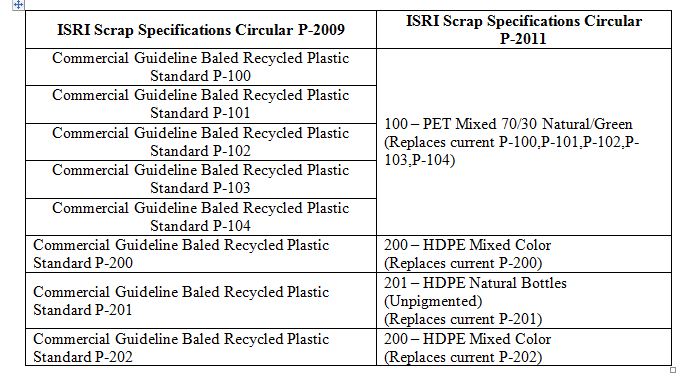For Immediate Release July 26, 2011
Washington, D.C. –The Institute of Scrap Recycling Industries, Inc. (ISRI) today released new specifications to modernize, standardize and streamline plastics buying and selling.
The new specifications were approved by ISRI’s Board of Directors. ISRI’s plastic scrap specifications will give buyers and sellers that handle plastic scrap a set of common terms and definitions they can use when they establish their business relationships. This common vernacular can help both parties avoid misunderstandings and ensure the terms they agree upon are mutually beneficial.
“As plastics have been increasingly recycled, ISRI’s plastic scrap specifications needed to be updated”, said ISRI President Robin Wiener. “We have seen a clear need for common ground when it comes to specifications for recycled plastics. One of our priorities here at ISRI is to ensure the free and fair trade of commodities in a way that can be understood in our global economy.”
“Historically, the recyclable plastics commodities market has been plagued with confusion surrounding the acceptable specifications of even the most commonly traded grades [of plastic]. This has resulted in increased market transaction costs and risk for all parties,” said Jonathan L. Cohen, President of Generated Materials Recovery and Chair of ISRI’s Plastic Recycling Council. “As such, the overarching objective of the ISRI Scrap Specs initiative is to help improve market efficiency by establishing clear guidelines for the major grades of plastics traded by ISRI members on a national and international basis. It is our expectation that similar to the long established ISRI specs for metals and fiber, the plastics specifications will become widely used throughout the global marketplace.”
The newly approved specifications are below:
Definitions
Baled – Loose material that is compressed and bound together.
Densified – Material that is compressed through mechanical means. Typically applies to foam (purged) and film (turned into “popcorn”). Densified material is typically sent on for additional processing.
Durable goods -- Electrical and electronic equipment, appliances, automobiles (called “transportation equipment” in ISO 15270), construction products (included in ISO 15270) and industrial equipment (included in ISO 15270)
Flake –A generic term that refers to size and shape. Typically consists of plastic bottles or plastic film typically ground into a chip.
Mixed Load Plastic – Shredded plastic that contains various types of resins and requires mechanical sorting to reach final specification. Typically baled and not granulated. Types and grades included in the bale to be agreed to by buyer and seller.
Purge – Plastic that has been melted and has hardened. This material has no set shape or form.
Regrind – A generic term that refers to hard rigid plastic typically ground into a chip. Typically consists of material that is the same grade, color and type. It can be used in extrusion or molding processes.
Shred -- Size reduced material. The typical upper size can be between 3” to 12”, although in some cases the upper size can be as small as about 1”. Size range, characteristics should be agreed to between buyer and seller.
Shredded Plastic – Generic term. Material that contains a high plastic content. Typically contains 90% plastic content.
Shredder residue -- The remaining mixture after the majority of metals have been recovered from durable goods “shred.” The mixture can contain plastics, rubber, wood, glass, rocks, dirt, paper, film, textiles, wires and other metals missed during the metal recovery process. The predominant single material is often plastic, which can vary from about 15 percent to about 90% depending on the type of durable goods and the steps taken in the metal separation process. Size range, characteristics should be agreed to between buyer and seller.
Types of Materials Requiring Descriptions
Bottles (Product Category 0)
Common Issues For This Category:
The following list applies all materials listed in this category.
- Caps, Enclosures, and Labels Are Acceptable
- Product Need Not Be Washed, But Preferred
100 - PET Mixed 70/30 Natural/Green
Consists of mixed, post-consumer PET food and beverage bottles and jars from curbside collection programs. May include up to 30% green tinted bottles. Thermoform container content subject to agreement between buyer and seller.
Product: Bottles Only
Source: Post-consumer material
Contamination:
- Total Allowed – 2% listed below
- Non-specified plastic or non-plastic material
- Injection Grade
- Examples – Buckets, Drums or Crates
General: Refer to the General Information Section for more information
200 - HDPE Mixed Color
Consists of mixed colored, post-consumer #2 HDPE containers from household products typically collected in residential recycling programs.Examples include detergent, orange juice and shampoo bottles.Should be free of wide mouth containers such as margarine or whipped cream tubs.Motor oil and herbicide/insecticide bottles are not allowed.
Product: Bottles Only
Source: Post-consumer material
Contamination:
- Total Allowed – 2% listed below
- Non-specified plastic or non-plastic material
- Injection Grade
- Examples – Butter tubs, Buckets, Drums, or Crates
General: Refer to the General Information Section for more information
201 - HDPE Natural Bottles (Unpigmented)
Consists of uncolored, post-consumer #2 HDPE containers from household products typically collected in residential recycling programs.Examples include milk, vinegar or ammonia bottles.Should be free of colored containers (including white) as well as any wide mouth containers.Herbicide/Insecticide bottles are not allowed.
Product: Bottles Only
Source: Post-consumer material
Contamination:
- Total Allowed – 2% listed below
- Non-specified plastic or non-plastic material
- Injection Grade
- Colored material
General: Refer to the General Information Section for more information
